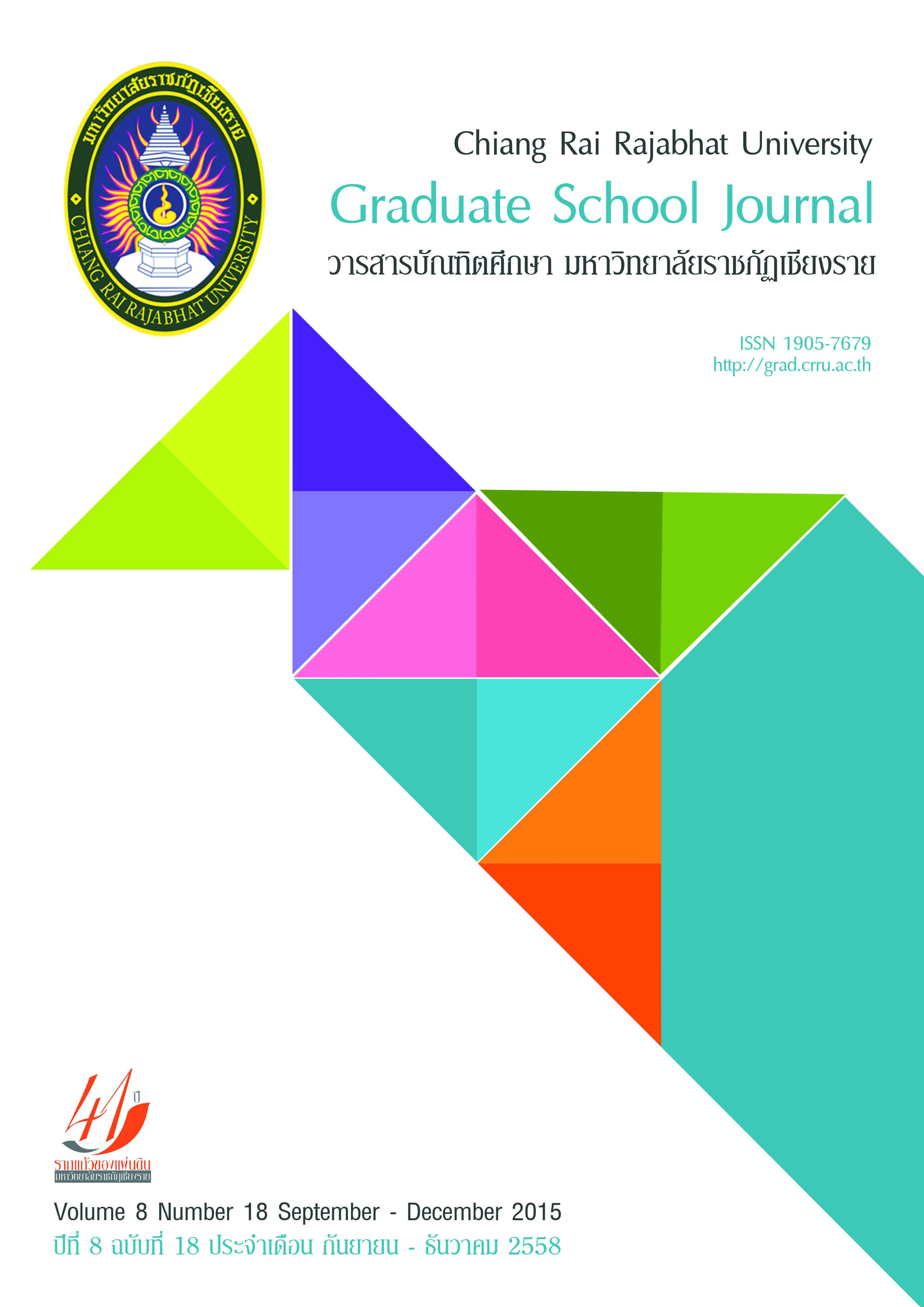ปัจจัยเชิงสาเหตุที่มีผลต่อการจัดการความเครียดของนักเรียนชั้นมัธยมศึกษาปีที่ 6 โรงเรียนในสังกัดอำเภอเมือง สังกัดสำนักงานเขตพื้นที่การศึกษามัธยมศึกษา เขต 36
Main Article Content
บทคัดย่อ
สรุปผลการวิจัยได้ ดังนี้
1. ตัวแปรสาเหตุมีผลต่อการจัดการความเครียดของนักเรียนชั้นมัธยมศึกษาปีที่ 6 โรงเรียนในสังกัดอำเภอเมือง จังหวัด เชียงราย
2. ตัวแปรสาเหตุมีความสัมพันธ์กับการจัดการความเครียดของนักเรียนชั้นมัธยมศึกษาปีที่ 6 โรงเรียนในสังกัด อำเภอเมือง จังหวัดเชียงราย
3. โมเดลสอดคล้องกับข้อมูลเชิงประจักษ์ โดยพิจารณาจากค่าไค-สแควร์ (χ2 = .01, df = 2) แตกต่างจากศูนย์อย่าง ไม่มีนัยสำคัญทางสถิติ ดัชนีวัดระดับความสอดคล้องกลมกลืน (Goodness – of – fit index : GFI = 1.00) ค่าดัชนีวัดระดับ ความสอดคล้องที่ปรับแก้แล้ว (Adjusted goodness – of – fit index : AGFI = 1.00) รวมทั้งดัชนีรากของกำลังสองเฉลี่ยของเศษ (root mean squared residual : RMR = .00053) ค่าอิทธิพลของตัวแปรในโมเดลมีนัยสำคัญทางสถิติที่ระดับ .01 ค่าสัมประสิทธิ์การพยากรณ์ หรือ R Square ตัวแปรการจัดการความเครียดของนักเรียนชั้นมัธยมศึกษาปีที่ 6 โรงเรียนในสังกัด อำเภอเมือง จังหวัดเชียงราย มีค่าเท่ากับ .61 แสดงว่าตัวแปรในโมเดลร่วมกันอธิบายความแปรปรวนของความวิตกจริตคณิตศาสตร์ ได้ร้อยละ 61
4. ปัจจัยที่มีอิทธิพลทางตรงและทางอ้อมสูงสุดต่อต่อการจัดการความเครียดของนักเรียนชั้นมัธยมศึกษาปีที่ 6 โรงเรียน ในสังกัดอำเภอเมือง จังหวัดเชียงราย ได้แก่ ปัจจัยด้านการสนับสนุนทางสังคม รองลงมา คือ ปัจจัยด้านกระบวนการคิดและปัจจัย ด้านบุคลิกภาพเข้มแข็ง ตามลำดับ
ตัวแปรที่อิทธิพลเฉพาะทางตรงต่อการจัดการความเครียดของนักเรียนชั้นมัธยมศึกษาปีที่ 6 ได้แก่ ปัจจัยด้านกระบวนการ คิด รองลงมา คือ ปัจจัยด้านการสนับสนุนทางสังคม และปัจจัยด้านแรงจูงใจ ตามลำดับ
ตัวแปรที่มีอิทธิพลเฉพาะทางอ้อมต่อการจัดการความเครียดของนักเรียนชั้นมัธยมศึกษาปีที่ 6 ได้แก่ ปัจจัยด้านบุคลิกภาพ เข้มแข็ง รองลงมา คือ ปัจจัยด้านการสนับสนุนทางสังคม และปัจจัยด้านกระบวนการคิด ตามลำดับ
Casual Factors Affecting the Tension Management of Matthayomsueksa 6 Students Studying in Secondary School of Muang District, the Office of Secondary Education Services Area 36
The purpose of this study aimed to explore casual factors affecting the tension management of Matthayomsueksa 6 students studying in the secondary schools of Muang District, the Office of Secondary Education Services Area 36, as well as and to investigate direct and indirect influences on the tension management, as well as to examine, according to the constructed model compared with the empirical data, correlations between casual factors and the tension management of students for data collection, a questionnaire in relations to student’s attitudes towards the tension management of Matthayomsueksa 6 students selected by the stratified sampling technique, in the academic year 2012, were conducted with 1,747 Matthayomsueksa 6 students out of the secondary schools of Muang District, the Office of Secondary Education Services Area 36. The data were statistically analyzed using the LISREL programme.
The findings of the study were as follows:
Casual factors directly affected the tension management of Matthayomsueksa 6 students studying in the secondary schools of Muang District, the Office of Secondary Education Services Area 36;
Casual factors were relatively concerned with the tension management of Matthayomsueksa students studying in the secondary schools of Muang District, the Office of Secondary Education Services Area 36;
The constructed model, as compared with the empirical data, with its chi-square (χ2) of .01 and degree of frequency (df) of 2, goodness - of – fit index (GFI) of 1.00, adjusted goodness – of – fit index (AGFI) of 1.00, root mean squared residual (RMR) of .00053, as well as the influence coefficient with its significance of .01, and R Square with its mean of 0.61 showed that their tension about mathematics as a variable found in this model were rated at 61 %.
Direct and indirect influences on the tension manangement of Matthayomsueksa 6 students studying in the secondary schools of Muang District, the Office of Secondary Education Services Area 36 were mostly appeared in terms of their social supports, followed by their critical thinking processes, and their personality management, respectively.
However, direct influences on the tension management of Matthayomsueksa 6 students studying in the secondary schools of Muang District, the Office of Secondary Education Services Area 36 were mostly observed in terms of their critical thinking processes, their social supports, and their learning motivation; otherwise, their personality management together with supportive surroundings, and their critical thinking processes were mostly observed in indirect influences.
Article Details
บทความที่ได้รับการตีพิมพ์เป็นลิขสิทธิ์ของวารสารมหาวิทยาลัยราชภัฎเชียงราย
ข้อความที่ปรากฏในบทความแต่ละเรื่องในวารสารวิชาการเล่มนี้เป็นความคิดเห็นส่วนตัวของผู้เขียนแต่ละท่านไม่เกี่ยวข้องกับมหาวิทยาลัยราชภัฎเชียงราย และคณาจารย์ท่านอื่นๆในมหาวิทยาลัยฯ แต่อย่างใด ความรับผิดชอบองค์ประกอบทั้งหมดของบทความแต่ละเรื่องเป็นของผู้เขียนแต่ละท่าน หากมีความผิดพลาดใดๆ ผู้เขียนแต่ละท่านจะรับผิดชอบบทความของตนเองแต่ผู้เดียว


